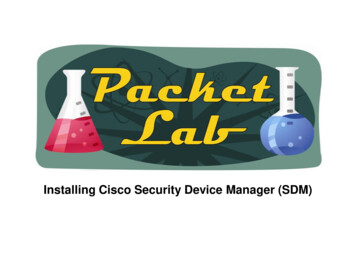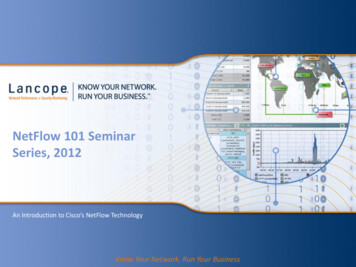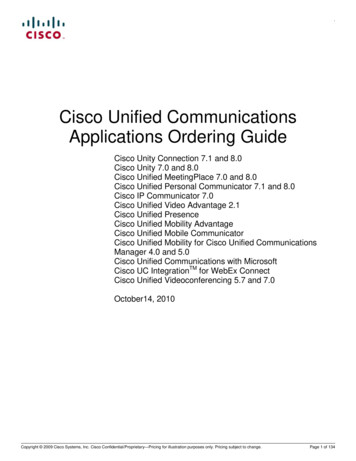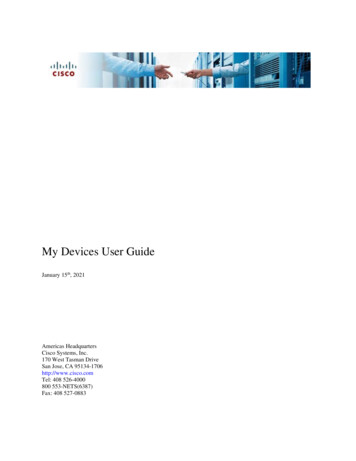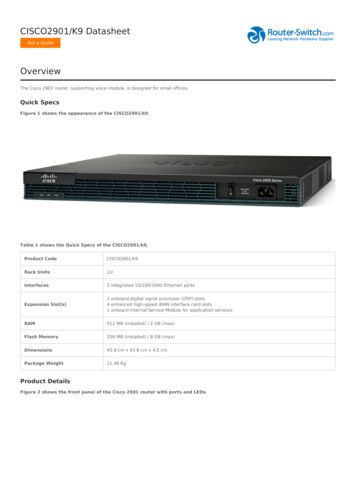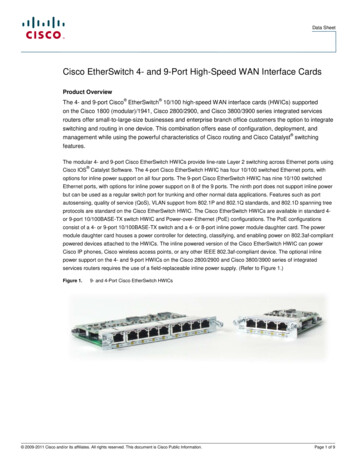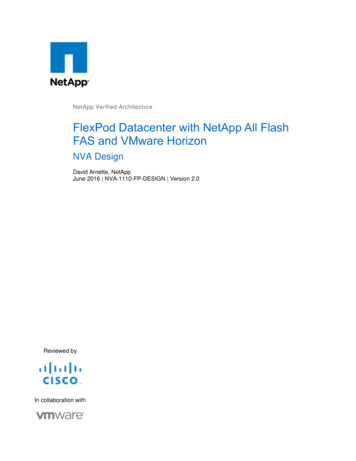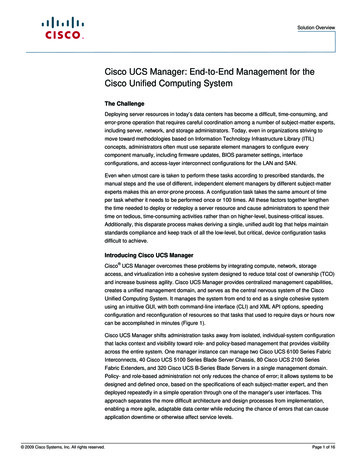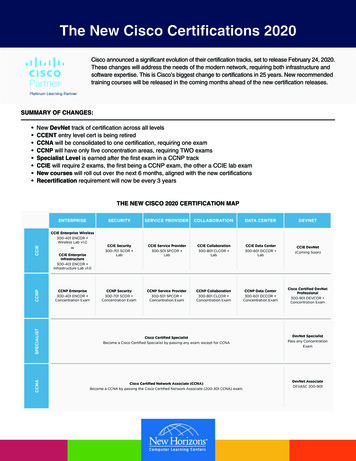
Transcription
The New Cisco Certifications 2020Cisco announced a significant evolution of their certification tracks, set to release February 24, 2020.These changes will address the needs of the modern network, requiring both infrastructure andsoftware expertise. This is Cisco’s biggest change to certifications in 25 years. New recommendedtraining courses will be released in the coming months ahead of the new certification releases.SUMMARY OF CHANGES: New DevNet track of certification across all levelsCCENT entry level cert is being retiredCCNA will be consolidated to one certification, requiring one examCCNP will have only five concentration areas, requiring TWO examsSpecialist Level is earned after the first exam in a CCNP trackCCIE will require 2 exams, the first being a CCNP exam, the other a CCIE lab examNew courses will roll out over the next 6 months, aligned with the new certificationsRecertification requirement will now be every 3 yearsTHE NEW CISCO 2020 CERTIFICATION MAP
CCNA CHANGESThe current Cisco Certified Entry Networking Technician (CCENT) will be retired. At the Associate level will be the newCCNA, which will validate a broad range of foundational knowledge and skills. It will have just one exam covering networkingand security fundamentals, as well as automation and programmability. Previously, CCNA candidates typically had to takemultiple exams to earn one of 10 different CCNA certifications. The new CCNA exam (#200-301) is scheduled to go liveFeb. 24, 2020. The new CCNA will replace these current certifications: CCNA CloudCCNA CollaborationCCNA Cyber OpsCCNA Data CenterCCDA Design CCNA IndustrialCCNA Routing and SwitchingCCNA SecurityCCNA Service ProviderCCNA WirelessThere will be a new course coming out for CCNA, expected this summer, which will cover the foundations now coveredin both ICND1 and ICND2, while the more advanced info in both of those courses will be moving to the new CCNP levelcourses, expected to release prior to February 2020.CCNP CHANGESMost CCNP certifications will also be retiring. Right now, networking professionals start a specialization track at the CCNAlevel. For example, CCNA Security leads to CCNP Security. However, after February 24, 2020, the one CCNA exam(200-301 CCNA) will cover networking basics and then you specialize at the CCNP level. You will be required to pass 2exams: a core exam and one concentration exam. Here’s the complete list of the new CCNPs: CCNP Enterprise CCNP Security CCNP Service Provider CCNP CollaborationCCNP Data CenterCisco Certified DevNet ProfessionalPassing any one of these exams will earn you the Cisco Certified Specialist title in that concentration. Passing the secondexam will earn you the CCNP in that focus area.CCIE CHANGESThere will be six CCIE tracks, and they no longer have dedicated CCIE written exams. Instead, candidates must pass theCCNP core exam and then take the 8-hour CCIE lab in the concentration of choice. For instance, to earn the CCIE Securityyou’d have to pass the CCNP Security core exam (SCOR 300-701) and then sit for the 8-hour lab, CCIE Security v6.0.That’s consistent across all the new CCIEs with the exception of CCIE Enterprise.In the case of the Enterprise track, you have two options: CCIE Enterprise Wireless and CCIE Enterprise Infrastructure.Both of these tracks adopt the CCNP Enterprise exam (ENCOR 300-401) as their written exam, and then diverge at thelab requirement. They each have a dedicated lab requirement specific to the track: CCIE Enterprise Wireless v1.0 andCCIE Enterprise Infrastructure v1.0.Here’s the complete list of the new CCIEs: CCIE Enterprise Wireless CCIE Enterprise Infrastructure CCIE Security CCIE Service Provider CCIE Collaboration CCIE Data Center
NEW CERTIFICATION TRACK: DEVNETCisco is launching a new certification track — DevNet. The DevNet track will combine programming (primarily withPython) and infrastructure. There will be four levels to the DevNet track: Cisco Certified DevNet Associate (CCNA-level)Cisco Certified DevNet SpecialistCisco Certified DevNet Professional (CCNP-level)Cisco Certified DevNet Expert (CCIE-level) – Coming soonThese tracks follow the same conventions as the other five tracks. You can either take the associate-level core exam toget certified at the CCNA level, pass one exam to become a Specialist, or take two exams to earn the professional-levelcertification.DEVNET CERTIFICATIONS
BENEFITS IN THE NEW CERTIFICATION STRUCTURE The ability to start where you want depending on your current level of expertise - no prerequisites to startearning your associate, specialist, professional or expert level certification.Continuing education credits for recertification and ongoing development are available for CCNA, Cisco CertifiedSpecialist, CCNP and CCIE.Easier path to CCIE status.New Emeritus lifetime tenure for CCIE certifications maintained continuously for 20 years.Badging for completing training courses.No more continuing education administrative fee, as of February 24, 2020.The recertification period for all certifications will be 3 years.FAQ’sQ: How do I qualify for a training badge or a certification in the new portfolio structure?A:Q: With fewer technology tracks, how can I get certified in a technology that relates to my work?A: Cisco designed the new training and certification program to be customizable. For example, CCNP includes moreoptions than ever before, with a concentration exam of your choice, and you can earn training badges for completingtraining and Specialist certifications for passing written, proctored exams in technologies and skills that relatedirectly to your job, interests, and aspirations.Q: What will happen to my existing certification when the new program goes into effect February 24, 2020?A: For CCNA, Specialist, and CCNP: Your current certification is still valid and will be active until its expiration date.When the new program goes into effect February 24, 2020, your current certification will be transitioned to anequivalent in the new program. For CCIE: If you are an active CCIE, your suspended year will be converted to an active year. For example, if youractive CCIE would have been suspended beginning April 21, 2020, you will sustain active status until April 21, 2021.Q: Will the CCNA certification still be required as a prerequisite for professional certifications?A: The CCNA certification will no longer be required as a prerequisite for professional certifications, giving learners theability to start where they choose in their learning journey.
Q: What is a technology core exam?A: A technology core exam is one of the two exams required for CCNP, CCIE, and Cisco Certified DevNet Professionalcertifications. For CCNP and CCIE, there are five technology core exams available, focused on Enterprise, Security,Service Provider, Collaboration and Data Center. Technology core exams cover the foundational and commonconcepts that are required for a candidate to be proficient in a technology architecture. For Cisco Certified DevNetProfessional, there is one DevNet core exam.Q: What is a concentration exam?A: A concentration exam is one of the two exams required for professional-level certification (CCNP). Concentrationexams take a deeper dive into a relevant and related technology to the core, allowing the candidate to choose a topicthat is either of interest or related to his or her chosen technology area of focus. For CCNP, there are concentrationexams for all five technology tracks, Enterprise, Security, Service Provider, Collaboration, and Data Center. There arealso multiple concentration exams available for Cisco Certified DevNet Professional.Q: Am I required to pass the technology core exam before I can take a concentration exam within the same track?A: No, you may take the exams in any order you choose.Q: How is the CCIE lab exam format changing?A: The CCIE lab format is changing to assess candidates’ skills through the entire adoption lifecycle of designing,deploying, operating and optimizing complex network scenarios. The lab exam will consist of 2 modules that are fixedin time and will be delivered in a fixed sequence: Module 1: Design (3 hours) Module 2: Deploy, Operate and Optimize (5 hours)Automation and Network Programmability skills are an integral part of both modules.Q: Why is Cisco now offering DevNet certifications?A: Cisco is announcing new DevNet certifications focused on validating the skill sets of software developers, DevOpsengineers, automation specialists, and other software professionals. The new offering will help unleash the fullcapabilities of the new network by educating network infrastructure engineers and software developers in applicationdevelopment, automation, DevOps, Cloud, and IoT.Q: How do I recertify as of February 24, 2020?A: As of February 24, 2020, certified individuals, including CCNA, Cisco Certified Specialist, CCNP and CCIE, will beable to recertify by either taking exams, earning Continuing Education credits or a mix of both. Continuing educationactivities include things like attending Cisco Live training sessions, authoring content, completing online trainingcourses, completing instructor-led training courses and more. Recertification will be required every 3 years.Q: If my certification is being retired, how long do I have before my current certification expires?A: Your current certification will be active until its current expiration date. If your certification is retired,any time remainingin your current certification lifecycle will remain unchanged.
Q: What will happen to the people who are studying for their CCNA, Specialist certification, CCNP, or CCIE right now?A: Cisco will be there to help those in transition every step of the way. We have a plan to get them from where they areto where they want to be. There is an eight-month lead time to enable learners to complete certifications under theexisting program OR plan to train and certify under the enhanced program. New and updated training courses will berolled out beginning in June 2019, representing a breadth and depth of critical skills in key technology areas. Newcertification tests will be available February 24, 2020. Dedicated tools and resources will help you navigate thetransition. For specific information on how your certification will transition, please visit the specific certificationtrack page.Q: How long do I have to complete my CCNA, Specialist certification, CCNP or CCIE before the current exams expire?A: There is an eight-month lead time to enable learners to complete certifications under the existing program OR plan totrain and certify under the enhanced program. New and updated training courses will be rolled out beginning in June2019, representing a breadth and depth of critical skills in key technology areas. New certification tests will beavailable February 24, 2020. Dedicated tools and resources will help you navigate the transition. For specificinformation on how your certification will transition, please visit the specific certification track page.
The new CCNA exam (#200-301) is scheduled to go live Feb. 24, 2020. The new CCNA will replace these current certifications: CCNA Cloud CCNA Industrial CCNA Collaboration CCNA Routing and Switching CCNA Cyber Ops CCNA Security CCNA Data Center CCNA Service Provider CCDA Design CCNA Wireless


